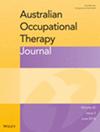Exploring first-year occupational therapy students' perspectives of an On-Country experience: A study from an Australian undergraduate program
Abstract
Introduction
In Australia, poor health outcomes for Aboriginal and Torres Strait Islander peoples have been well-documented. This often results from colonising practices embedded in systemic, environmental, economic, and social factors leading to marginalisation. To address these injustices, directives to enshrine cultural safety in health-care education/training have been proposed to ensure the development of a culturally safe workforce. Several frameworks have been developed to support tertiary education providers to decolonise curricula. However, with little published about occupational therapy curricula, how and whether occupational therapy students and/or graduates are culturally safe is not known. The purpose of this study is to capture the experiences of students that attended an inaugural On-Country experience embedded within a first-year, undergraduate occupational therapy unit (subject).
Methods
This qualitative study used a reflexive thematic analysis method to recruit undergraduate students enrolled in a first-year occupational therapy unit, which incorporated an immersive On-Country learning experience. Data were collected from students via online blog posts, which prompted participants to describe their observations and reflections pre and post the On-Country experience. Data were analysed using Braun and Clarke's six stage thematic analysis process to generate themes.
Consumer and Community Involvement
This study was conducted and authored with input from two diverse Aboriginal and Torres Strait Islander people—the facilitator and a colleague of mixed heritage. The tailored On-Country experience was facilitated by the Wadawurrung Traditional Owners Corporation.
Findings
Analysis of the responses revealed three overarching themes: (1) Creation of a learning experience; (2) an awareness of embarking on a journey to being culturally safe practitioners and recognition of an emerging occupational therapy lens; and (3) engagement and connection to clinical practice.
Conclusion
Students expressed enhanced awareness and reflexivity in that they examined themselves, their history and recognised the influential value this had on health and wellbeing. This awareness can be used as a tool/opportunity to inform curriculum design and promote development of professional identity.
PLAIN LANGUAGE SUMMARY
Aboriginal and Torres Strait Islander peoples often have worse health because the health-care system has treated them unfairly. To change this, we need a fair system and health workers who give safe and respectful care.
Culturally safe care means health workers must think about what they know and how they act. Universities try to teach this, but there are problems. Some teachers and students feel unsure. There are not enough resources. Health courses mostly follow Western ideas. Strong leaders are needed to help change this.
One way to improve learning is by, including Aboriginal and Torres Strait Islander knowledges. This study looked at what first-year occupational therapy students learned from an On-Country experience. Students shared their thoughts online. They said the experience helped them think in new ways and understand the struggles of Aboriginal and Torres Strait Islander peoples. They are not yet working as health professionals, but they know their role in making health-care fair and safe. Many said, they now see the world differently. But more learning and changes in universities are needed.

 求助内容:
求助内容: 应助结果提醒方式:
应助结果提醒方式:


